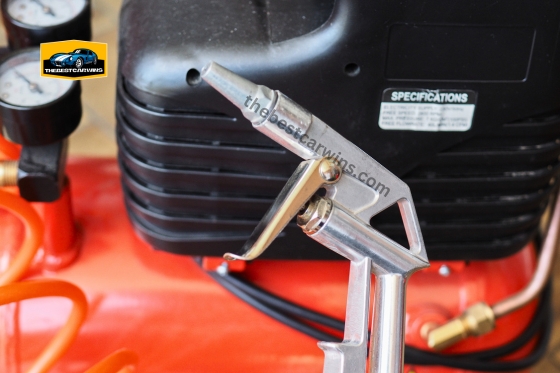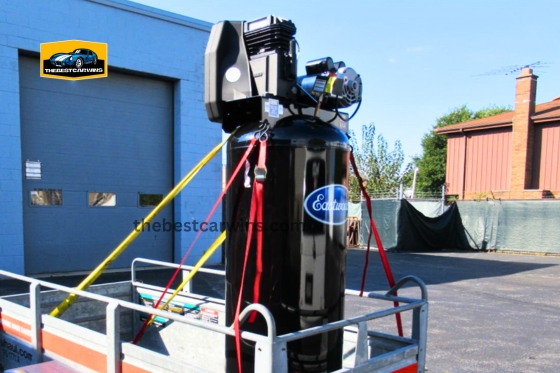
Introduction
Air compressors play a vital role in numerous industries and applications where compressed air is needed. Understanding the key concepts and terminologies associated with air compressors is essential for anyone working with these devices. One such important term is CFM, which stands for Cubic Feet per Minute. CFM measurement helps determine the airflow capacity of an air compressor and ensures that the compressor can meet the demands of different tools and equipment.
In this article, we will delve into the concept of CFM in air compressors, its significance, and how it affects the overall performance of these machines. Whether you are a professional in the industry or simply curious about air compressors, this article will provide you with a clear understanding of CFM and its role in the world of compressed air.
What is CFM in Air Compressor?
CFM, which stands for Cubic Feet per Minute, is a crucial measurement in the field of air compressors. It is used to determine the airflow capacity or volume of air that an air compressor can deliver. CFM indicates the rate at which air is circulated or compressed by the compressor unit.
In simple terms, CFM refers to the amount of air that an air compressor can supply within a minute. This measurement is essential in various applications where compressed air is required, such as pneumatic tools, spray guns, industrial machinery, and many other systems that rely on compressed air.
Understanding CFM is important because different tools and equipment have specific CFM requirements to operate effectively. If the air compressor doesn’t supply sufficient CFM to meet the demands of a particular tool, its performance may be compromised.
To illustrate the concept, let’s consider an example. Suppose you have an air compressor with a CFM rating of 10. This means that the compressor can deliver 10 cubic feet of air per minute. If you are using a tool that requires 5 CFM, the compressor can easily handle it. However, if you use a tool that requires 15 CFM, the compressor will struggle to meet the demand, resulting in reduced performance or inefficiency.
It’s worth mentioning that CFM can be affected by factors such as the size and design of the compressor, the motor power, the air pressure, and the efficiency of the system. These variables can influence the overall CFM output of an air compressor.
When selecting an air compressor, it is important to consider the CFM requirements of the tools or equipment you plan to use. It is recommended to choose an air compressor with a CFM rating that meets or exceeds the highest CFM requirement among the tools you intend to operate. This ensures that you have sufficient airflow for all your applications, allowing your tools and equipment to work optimally.
Why is CFM Important in Air Compressor Performance?
CFM plays a vital role in determining the air compressor’s performance. It signifies the compressor’s ability to power pneumatic tools and equipment. Different tools require varying amounts of airflow to operate effectively. Insufficient CFM can lead to reduced tool performance and may cause them to underperform or even stall. Therefore, it is crucial to choose an air compressor with an adequate CFM rating for the intended applications.
How Much CFM Does My Air Compressor Need?
The required CFM for an air compressor depends on the specific tools or equipment it will be used with. Each pneumatic tool has a recommended CFM rating provided by the manufacturer. To determine the CFM needed, add up the CFM requirements of all the tools you plan to use simultaneously. It is important to consider the highest CFM tool you will be using to ensure that your air compressor can handle the maximum demand.
Does Higher CFM Mean a Better Compressor?
While a higher CFM rating generally indicates a more capable air compressor, it does not necessarily mean it is always better. The ideal CFM requirement depends on the intended applications. For light-duty tasks, a compressor with a lower CFM rating may suffice, while heavy-duty applications demand compressors with higher CFM ratings. It is essential to consider the specific needs and match them with the appropriate CFM capacity to ensure efficient operation.
How CFM Impacts Air Compressor Efficiency
CFM directly affects the efficiency of an air compressor. If the CFM rating is insufficient for the tools being used, the compressor will struggle to deliver the required airflow. In such cases, the compressor may continuously run, leading to increased energy consumption, excessive wear and tear, and reduced overall efficiency. Choosing an air compressor with a suitable CFM rating optimizes its performance and prevents unnecessary strain on the system.
How Does CFM Influence the Air Pressure Produced by an Air Compressor?
CFM and air pressure (measured in pounds per square inch or PSI) are interconnected but separate aspects of an air compressor’s performance. CFM primarily relates to the volume of airflow, while PSI indicates the force at which the air is delivered. While CFM influences the volume of air produced, the air pressure is determined by the compressor’s design and motor power. Higher CFM values can complement higher PSI ratings to deliver more powerful and efficient performance.
Conclusion
CFM is a critical factor to consider when selecting an air compressor. It determines the compressor’s ability to provide an adequate volume of airflow to power pneumatic tools and equipment effectively. Choosing an air compressor with the right CFM rating for the intended applications ensures optimal performance, energy efficiency, and prevents potential issues such as tool stalling or underperformance. Understanding the importance of CFM empowers users to make informed decisions when investing in an air compressor.
Read More: How to Use a Air Compressor
FAQ (Frequently Asked Questions): What is CFM in Air Compressor?
What does CFM stand for?
CFM stands for Cubic Feet per Minute.
Why is CFM important in air compressor performance?
CFM is crucial as it indicates the airflow capacity of an air compressor and affects the performance of pneumatic tools and equipment.
How do I determine the CFM requirement for my air compressor?
The CFM requirement depends on the specific tools being used. Check the recommended CFM ratings provided by the tool manufacturers and add them up for simultaneous tool usage.
Does a higher CFM rating always mean a better air compressor?
Not necessarily. The ideal CFM rating depends on the intended applications. A higher CFM rating may be beneficial for heavy-duty tasks, but a lower CFM rating may suffice for lighter applications.
How does CFM impact air compressor efficiency?
If the CFM rating is insufficient, the compressor may run continuously, leading to increased energy consumption, wear, and reduced efficiency. Choosing a suitable CFM rating optimizes the compressor’s performance.
How does CFM relate to air pressure (PSI)?
CFM primarily relates to the volume of airflow, while PSI indicates the force at which the air is delivered. CFM and PSI are separate but interconnected aspects of an air compressor’s performance.







